Ethical and Cultural Considerations in End-of-Life Care: A Reflection
VerifiedAdded on 2022/09/14
|7
|2017
|12
Essay
AI Summary
This essay reflects on the complexities of palliative care, focusing on the ethical dilemmas and cultural sensitivities involved in providing end-of-life care to a 20-year-old Aboriginal and Torres Strait Islander patient, John, with end-stage renal disease (ESRD). The paper examines the collaborative decision-making process of a multidisciplinary team, including registered nurses, physicians, and other healthcare professionals, in respecting John's autonomy to choose home care over further hospital treatment. It delves into ethical principles like autonomy, beneficence, and justice, alongside cultural practices and beliefs within the Aboriginal community, emphasizing the importance of respecting traditions and involving family in care decisions. The author reflects on their personal beliefs about life and death, acknowledging potential conflicts between medical interventions and cultural practices, and outlines a commitment to upholding ethical principles and cultural sensitivity in practice. The essay highlights the challenges faced in palliative care, emphasizing the need for ethical considerations and cultural competence to provide patient-centered care.
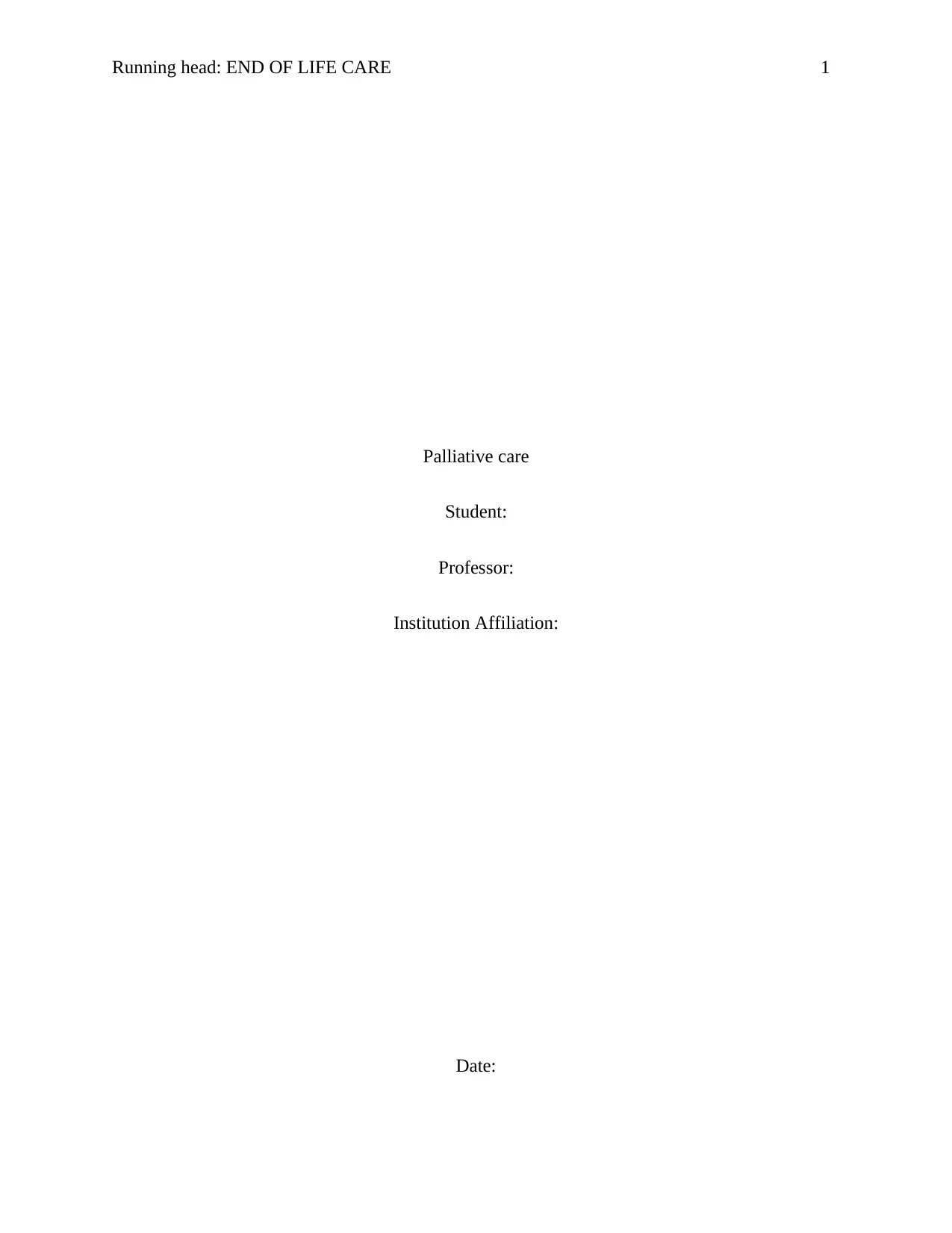
Running head: END OF LIFE CARE 1
Palliative care
Student:
Professor:
Institution Affiliation:
Date:
Palliative care
Student:
Professor:
Institution Affiliation:
Date:
Paraphrase This Document
Need a fresh take? Get an instant paraphrase of this document with our AI Paraphraser
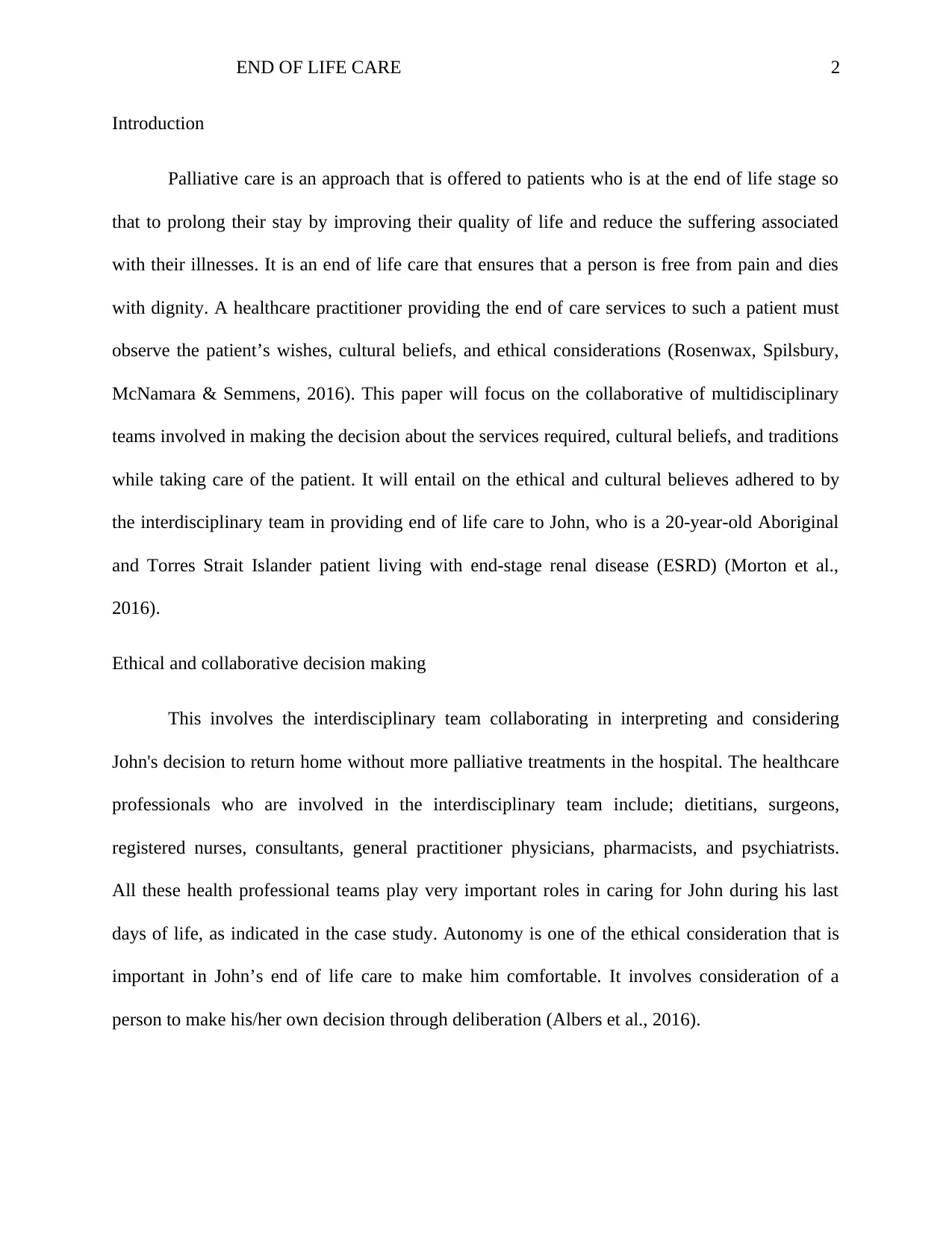
END OF LIFE CARE 2
Introduction
Palliative care is an approach that is offered to patients who is at the end of life stage so
that to prolong their stay by improving their quality of life and reduce the suffering associated
with their illnesses. It is an end of life care that ensures that a person is free from pain and dies
with dignity. A healthcare practitioner providing the end of care services to such a patient must
observe the patient’s wishes, cultural beliefs, and ethical considerations (Rosenwax, Spilsbury,
McNamara & Semmens, 2016). This paper will focus on the collaborative of multidisciplinary
teams involved in making the decision about the services required, cultural beliefs, and traditions
while taking care of the patient. It will entail on the ethical and cultural believes adhered to by
the interdisciplinary team in providing end of life care to John, who is a 20-year-old Aboriginal
and Torres Strait Islander patient living with end-stage renal disease (ESRD) (Morton et al.,
2016).
Ethical and collaborative decision making
This involves the interdisciplinary team collaborating in interpreting and considering
John's decision to return home without more palliative treatments in the hospital. The healthcare
professionals who are involved in the interdisciplinary team include; dietitians, surgeons,
registered nurses, consultants, general practitioner physicians, pharmacists, and psychiatrists.
All these health professional teams play very important roles in caring for John during his last
days of life, as indicated in the case study. Autonomy is one of the ethical consideration that is
important in John’s end of life care to make him comfortable. It involves consideration of a
person to make his/her own decision through deliberation (Albers et al., 2016).
Introduction
Palliative care is an approach that is offered to patients who is at the end of life stage so
that to prolong their stay by improving their quality of life and reduce the suffering associated
with their illnesses. It is an end of life care that ensures that a person is free from pain and dies
with dignity. A healthcare practitioner providing the end of care services to such a patient must
observe the patient’s wishes, cultural beliefs, and ethical considerations (Rosenwax, Spilsbury,
McNamara & Semmens, 2016). This paper will focus on the collaborative of multidisciplinary
teams involved in making the decision about the services required, cultural beliefs, and traditions
while taking care of the patient. It will entail on the ethical and cultural believes adhered to by
the interdisciplinary team in providing end of life care to John, who is a 20-year-old Aboriginal
and Torres Strait Islander patient living with end-stage renal disease (ESRD) (Morton et al.,
2016).
Ethical and collaborative decision making
This involves the interdisciplinary team collaborating in interpreting and considering
John's decision to return home without more palliative treatments in the hospital. The healthcare
professionals who are involved in the interdisciplinary team include; dietitians, surgeons,
registered nurses, consultants, general practitioner physicians, pharmacists, and psychiatrists.
All these health professional teams play very important roles in caring for John during his last
days of life, as indicated in the case study. Autonomy is one of the ethical consideration that is
important in John’s end of life care to make him comfortable. It involves consideration of a
person to make his/her own decision through deliberation (Albers et al., 2016).
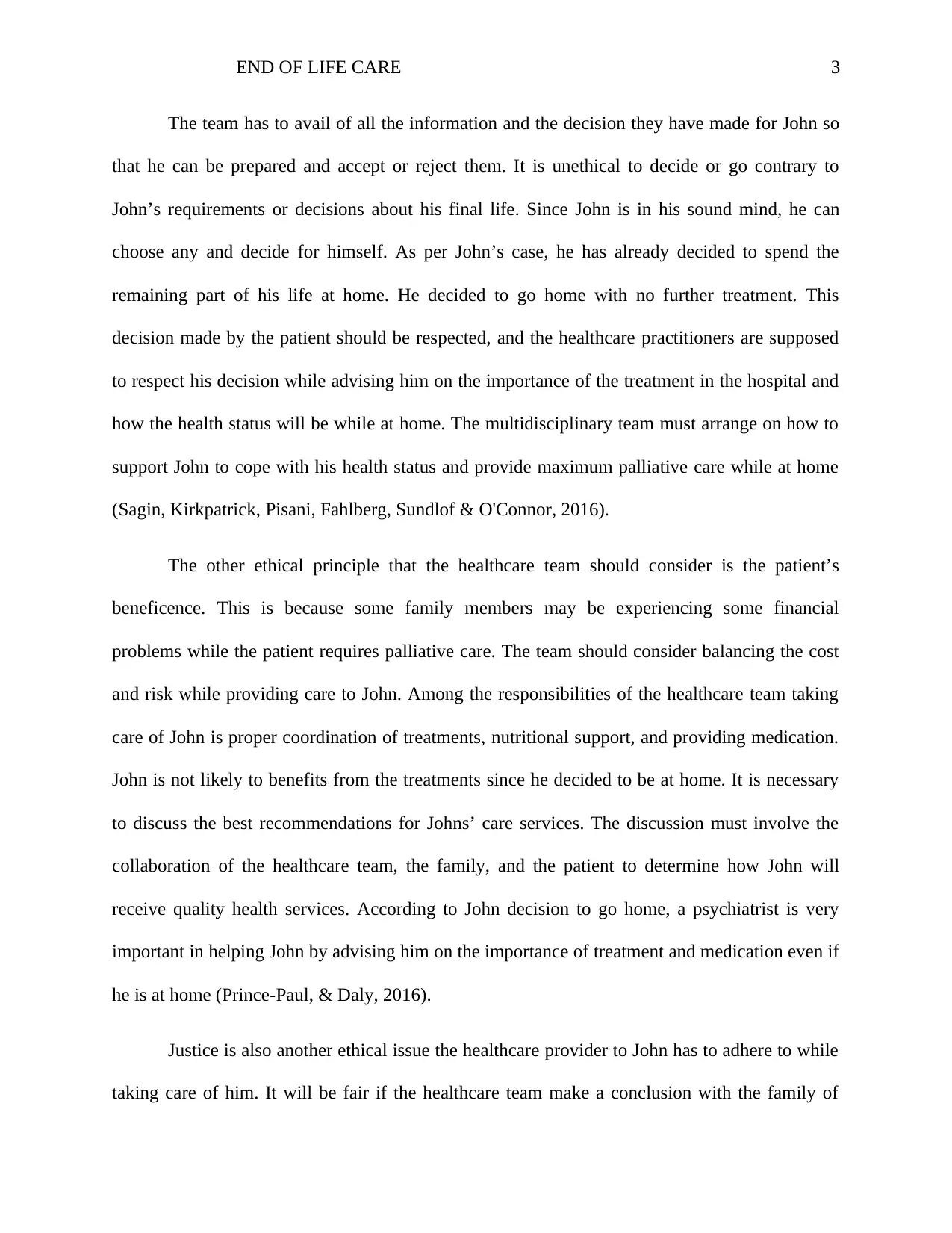
END OF LIFE CARE 3
The team has to avail of all the information and the decision they have made for John so
that he can be prepared and accept or reject them. It is unethical to decide or go contrary to
John’s requirements or decisions about his final life. Since John is in his sound mind, he can
choose any and decide for himself. As per John’s case, he has already decided to spend the
remaining part of his life at home. He decided to go home with no further treatment. This
decision made by the patient should be respected, and the healthcare practitioners are supposed
to respect his decision while advising him on the importance of the treatment in the hospital and
how the health status will be while at home. The multidisciplinary team must arrange on how to
support John to cope with his health status and provide maximum palliative care while at home
(Sagin, Kirkpatrick, Pisani, Fahlberg, Sundlof & O'Connor, 2016).
The other ethical principle that the healthcare team should consider is the patient’s
beneficence. This is because some family members may be experiencing some financial
problems while the patient requires palliative care. The team should consider balancing the cost
and risk while providing care to John. Among the responsibilities of the healthcare team taking
care of John is proper coordination of treatments, nutritional support, and providing medication.
John is not likely to benefits from the treatments since he decided to be at home. It is necessary
to discuss the best recommendations for Johns’ care services. The discussion must involve the
collaboration of the healthcare team, the family, and the patient to determine how John will
receive quality health services. According to John decision to go home, a psychiatrist is very
important in helping John by advising him on the importance of treatment and medication even if
he is at home (Prince-Paul, & Daly, 2016).
Justice is also another ethical issue the healthcare provider to John has to adhere to while
taking care of him. It will be fair if the healthcare team make a conclusion with the family of
The team has to avail of all the information and the decision they have made for John so
that he can be prepared and accept or reject them. It is unethical to decide or go contrary to
John’s requirements or decisions about his final life. Since John is in his sound mind, he can
choose any and decide for himself. As per John’s case, he has already decided to spend the
remaining part of his life at home. He decided to go home with no further treatment. This
decision made by the patient should be respected, and the healthcare practitioners are supposed
to respect his decision while advising him on the importance of the treatment in the hospital and
how the health status will be while at home. The multidisciplinary team must arrange on how to
support John to cope with his health status and provide maximum palliative care while at home
(Sagin, Kirkpatrick, Pisani, Fahlberg, Sundlof & O'Connor, 2016).
The other ethical principle that the healthcare team should consider is the patient’s
beneficence. This is because some family members may be experiencing some financial
problems while the patient requires palliative care. The team should consider balancing the cost
and risk while providing care to John. Among the responsibilities of the healthcare team taking
care of John is proper coordination of treatments, nutritional support, and providing medication.
John is not likely to benefits from the treatments since he decided to be at home. It is necessary
to discuss the best recommendations for Johns’ care services. The discussion must involve the
collaboration of the healthcare team, the family, and the patient to determine how John will
receive quality health services. According to John decision to go home, a psychiatrist is very
important in helping John by advising him on the importance of treatment and medication even if
he is at home (Prince-Paul, & Daly, 2016).
Justice is also another ethical issue the healthcare provider to John has to adhere to while
taking care of him. It will be fair if the healthcare team make a conclusion with the family of
⊘ This is a preview!⊘
Do you want full access?
Subscribe today to unlock all pages.

Trusted by 1+ million students worldwide
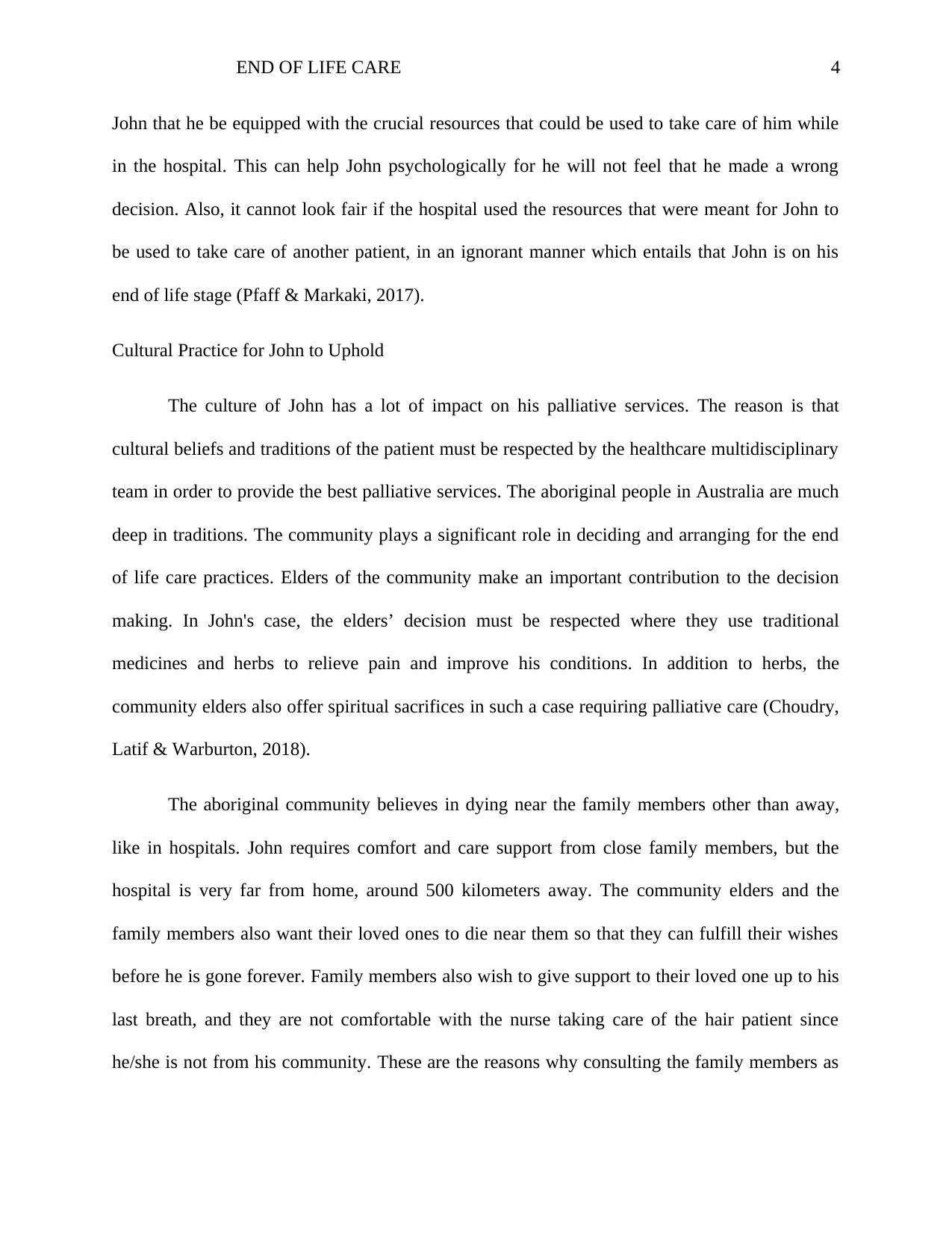
END OF LIFE CARE 4
John that he be equipped with the crucial resources that could be used to take care of him while
in the hospital. This can help John psychologically for he will not feel that he made a wrong
decision. Also, it cannot look fair if the hospital used the resources that were meant for John to
be used to take care of another patient, in an ignorant manner which entails that John is on his
end of life stage (Pfaff & Markaki, 2017).
Cultural Practice for John to Uphold
The culture of John has a lot of impact on his palliative services. The reason is that
cultural beliefs and traditions of the patient must be respected by the healthcare multidisciplinary
team in order to provide the best palliative services. The aboriginal people in Australia are much
deep in traditions. The community plays a significant role in deciding and arranging for the end
of life care practices. Elders of the community make an important contribution to the decision
making. In John's case, the elders’ decision must be respected where they use traditional
medicines and herbs to relieve pain and improve his conditions. In addition to herbs, the
community elders also offer spiritual sacrifices in such a case requiring palliative care (Choudry,
Latif & Warburton, 2018).
The aboriginal community believes in dying near the family members other than away,
like in hospitals. John requires comfort and care support from close family members, but the
hospital is very far from home, around 500 kilometers away. The community elders and the
family members also want their loved ones to die near them so that they can fulfill their wishes
before he is gone forever. Family members also wish to give support to their loved one up to his
last breath, and they are not comfortable with the nurse taking care of the hair patient since
he/she is not from his community. These are the reasons why consulting the family members as
John that he be equipped with the crucial resources that could be used to take care of him while
in the hospital. This can help John psychologically for he will not feel that he made a wrong
decision. Also, it cannot look fair if the hospital used the resources that were meant for John to
be used to take care of another patient, in an ignorant manner which entails that John is on his
end of life stage (Pfaff & Markaki, 2017).
Cultural Practice for John to Uphold
The culture of John has a lot of impact on his palliative services. The reason is that
cultural beliefs and traditions of the patient must be respected by the healthcare multidisciplinary
team in order to provide the best palliative services. The aboriginal people in Australia are much
deep in traditions. The community plays a significant role in deciding and arranging for the end
of life care practices. Elders of the community make an important contribution to the decision
making. In John's case, the elders’ decision must be respected where they use traditional
medicines and herbs to relieve pain and improve his conditions. In addition to herbs, the
community elders also offer spiritual sacrifices in such a case requiring palliative care (Choudry,
Latif & Warburton, 2018).
The aboriginal community believes in dying near the family members other than away,
like in hospitals. John requires comfort and care support from close family members, but the
hospital is very far from home, around 500 kilometers away. The community elders and the
family members also want their loved ones to die near them so that they can fulfill their wishes
before he is gone forever. Family members also wish to give support to their loved one up to his
last breath, and they are not comfortable with the nurse taking care of the hair patient since
he/she is not from his community. These are the reasons why consulting the family members as
Paraphrase This Document
Need a fresh take? Get an instant paraphrase of this document with our AI Paraphraser
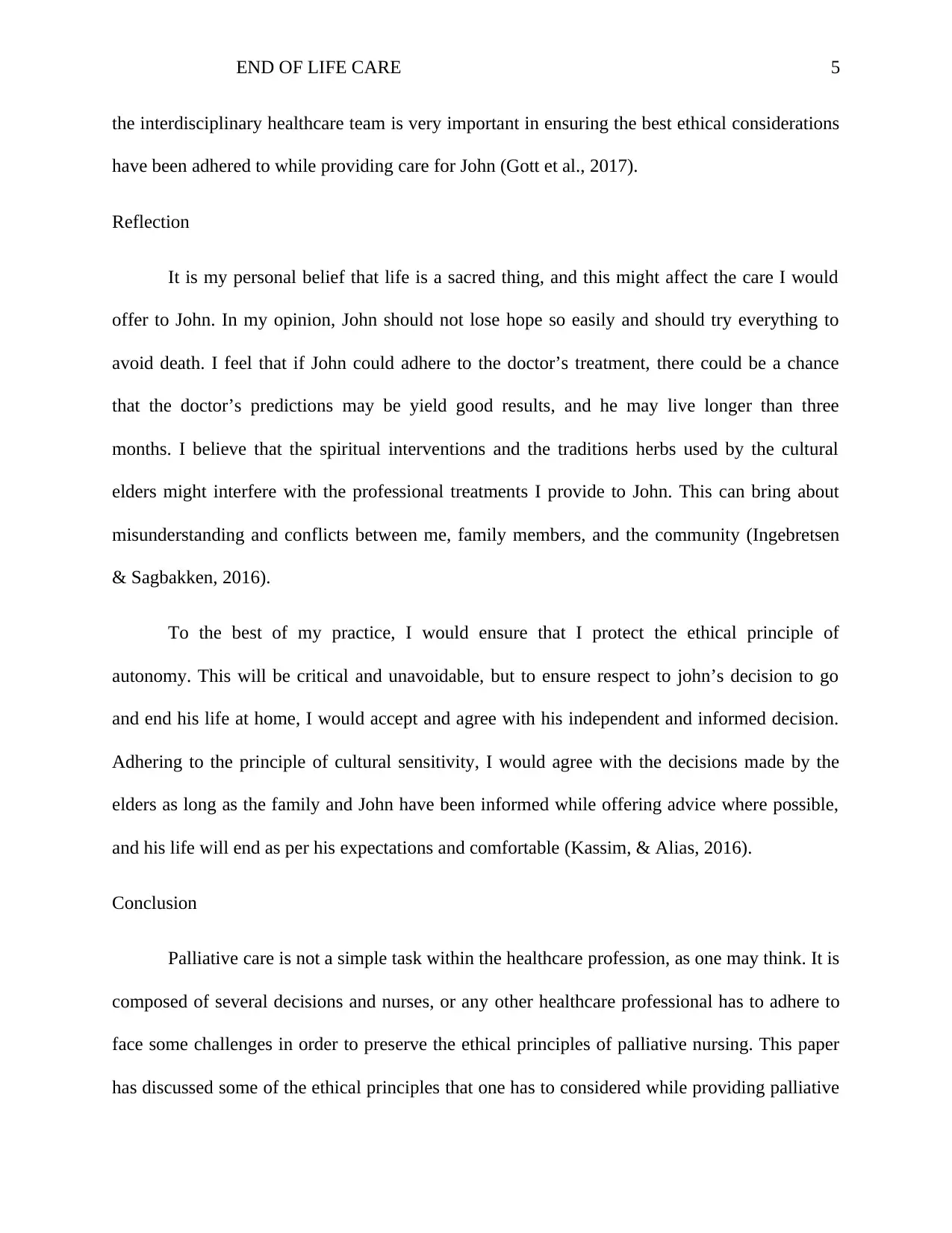
END OF LIFE CARE 5
the interdisciplinary healthcare team is very important in ensuring the best ethical considerations
have been adhered to while providing care for John (Gott et al., 2017).
Reflection
It is my personal belief that life is a sacred thing, and this might affect the care I would
offer to John. In my opinion, John should not lose hope so easily and should try everything to
avoid death. I feel that if John could adhere to the doctor’s treatment, there could be a chance
that the doctor’s predictions may be yield good results, and he may live longer than three
months. I believe that the spiritual interventions and the traditions herbs used by the cultural
elders might interfere with the professional treatments I provide to John. This can bring about
misunderstanding and conflicts between me, family members, and the community (Ingebretsen
& Sagbakken, 2016).
To the best of my practice, I would ensure that I protect the ethical principle of
autonomy. This will be critical and unavoidable, but to ensure respect to john’s decision to go
and end his life at home, I would accept and agree with his independent and informed decision.
Adhering to the principle of cultural sensitivity, I would agree with the decisions made by the
elders as long as the family and John have been informed while offering advice where possible,
and his life will end as per his expectations and comfortable (Kassim, & Alias, 2016).
Conclusion
Palliative care is not a simple task within the healthcare profession, as one may think. It is
composed of several decisions and nurses, or any other healthcare professional has to adhere to
face some challenges in order to preserve the ethical principles of palliative nursing. This paper
has discussed some of the ethical principles that one has to considered while providing palliative
the interdisciplinary healthcare team is very important in ensuring the best ethical considerations
have been adhered to while providing care for John (Gott et al., 2017).
Reflection
It is my personal belief that life is a sacred thing, and this might affect the care I would
offer to John. In my opinion, John should not lose hope so easily and should try everything to
avoid death. I feel that if John could adhere to the doctor’s treatment, there could be a chance
that the doctor’s predictions may be yield good results, and he may live longer than three
months. I believe that the spiritual interventions and the traditions herbs used by the cultural
elders might interfere with the professional treatments I provide to John. This can bring about
misunderstanding and conflicts between me, family members, and the community (Ingebretsen
& Sagbakken, 2016).
To the best of my practice, I would ensure that I protect the ethical principle of
autonomy. This will be critical and unavoidable, but to ensure respect to john’s decision to go
and end his life at home, I would accept and agree with his independent and informed decision.
Adhering to the principle of cultural sensitivity, I would agree with the decisions made by the
elders as long as the family and John have been informed while offering advice where possible,
and his life will end as per his expectations and comfortable (Kassim, & Alias, 2016).
Conclusion
Palliative care is not a simple task within the healthcare profession, as one may think. It is
composed of several decisions and nurses, or any other healthcare professional has to adhere to
face some challenges in order to preserve the ethical principles of palliative nursing. This paper
has discussed some of the ethical principles that one has to considered while providing palliative
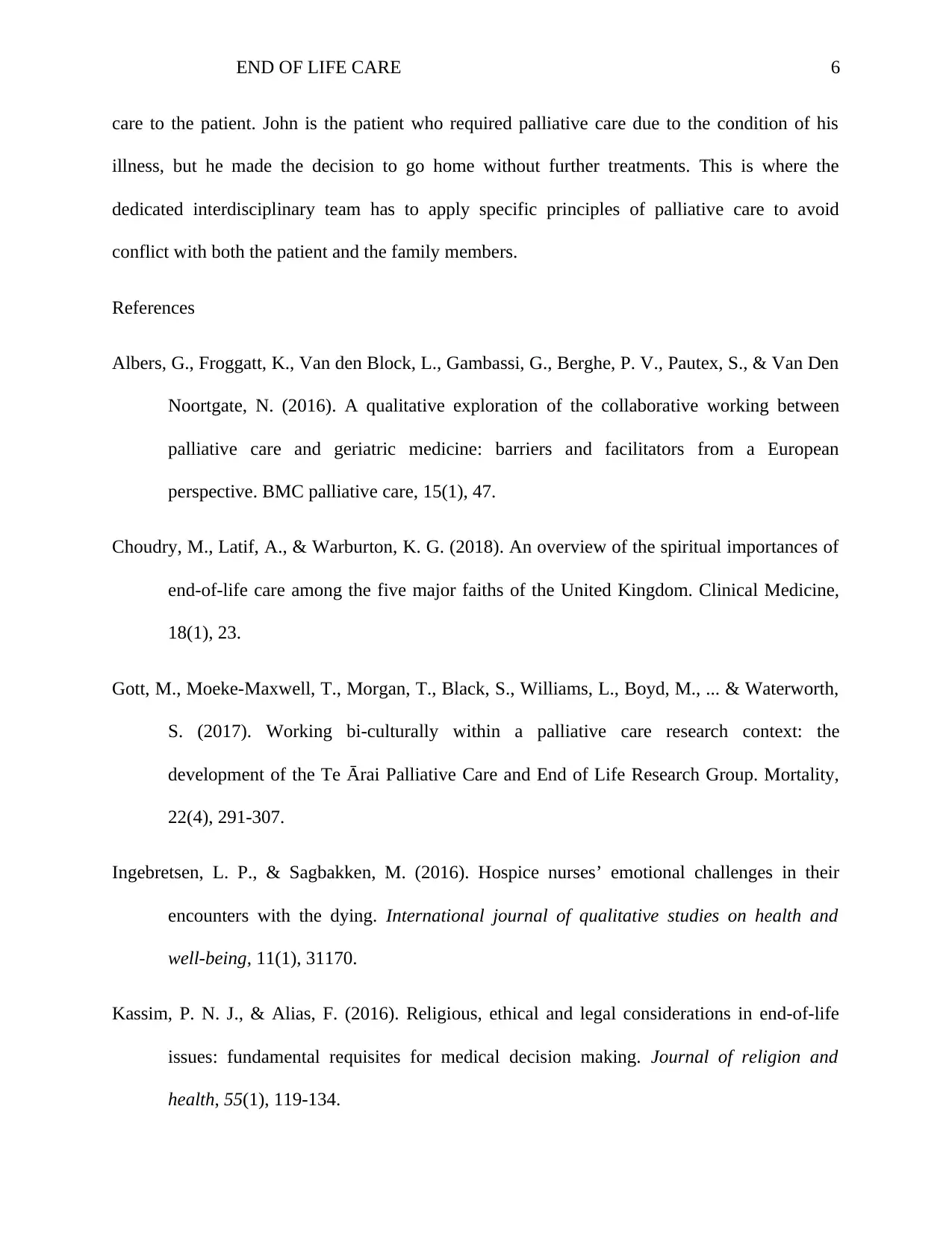
END OF LIFE CARE 6
care to the patient. John is the patient who required palliative care due to the condition of his
illness, but he made the decision to go home without further treatments. This is where the
dedicated interdisciplinary team has to apply specific principles of palliative care to avoid
conflict with both the patient and the family members.
References
Albers, G., Froggatt, K., Van den Block, L., Gambassi, G., Berghe, P. V., Pautex, S., & Van Den
Noortgate, N. (2016). A qualitative exploration of the collaborative working between
palliative care and geriatric medicine: barriers and facilitators from a European
perspective. BMC palliative care, 15(1), 47.
Choudry, M., Latif, A., & Warburton, K. G. (2018). An overview of the spiritual importances of
end-of-life care among the five major faiths of the United Kingdom. Clinical Medicine,
18(1), 23.
Gott, M., Moeke-Maxwell, T., Morgan, T., Black, S., Williams, L., Boyd, M., ... & Waterworth,
S. (2017). Working bi-culturally within a palliative care research context: the
development of the Te Ārai Palliative Care and End of Life Research Group. Mortality,
22(4), 291-307.
Ingebretsen, L. P., & Sagbakken, M. (2016). Hospice nurses’ emotional challenges in their
encounters with the dying. International journal of qualitative studies on health and
well-being, 11(1), 31170.
Kassim, P. N. J., & Alias, F. (2016). Religious, ethical and legal considerations in end-of-life
issues: fundamental requisites for medical decision making. Journal of religion and
health, 55(1), 119-134.
care to the patient. John is the patient who required palliative care due to the condition of his
illness, but he made the decision to go home without further treatments. This is where the
dedicated interdisciplinary team has to apply specific principles of palliative care to avoid
conflict with both the patient and the family members.
References
Albers, G., Froggatt, K., Van den Block, L., Gambassi, G., Berghe, P. V., Pautex, S., & Van Den
Noortgate, N. (2016). A qualitative exploration of the collaborative working between
palliative care and geriatric medicine: barriers and facilitators from a European
perspective. BMC palliative care, 15(1), 47.
Choudry, M., Latif, A., & Warburton, K. G. (2018). An overview of the spiritual importances of
end-of-life care among the five major faiths of the United Kingdom. Clinical Medicine,
18(1), 23.
Gott, M., Moeke-Maxwell, T., Morgan, T., Black, S., Williams, L., Boyd, M., ... & Waterworth,
S. (2017). Working bi-culturally within a palliative care research context: the
development of the Te Ārai Palliative Care and End of Life Research Group. Mortality,
22(4), 291-307.
Ingebretsen, L. P., & Sagbakken, M. (2016). Hospice nurses’ emotional challenges in their
encounters with the dying. International journal of qualitative studies on health and
well-being, 11(1), 31170.
Kassim, P. N. J., & Alias, F. (2016). Religious, ethical and legal considerations in end-of-life
issues: fundamental requisites for medical decision making. Journal of religion and
health, 55(1), 119-134.
⊘ This is a preview!⊘
Do you want full access?
Subscribe today to unlock all pages.

Trusted by 1+ million students worldwide
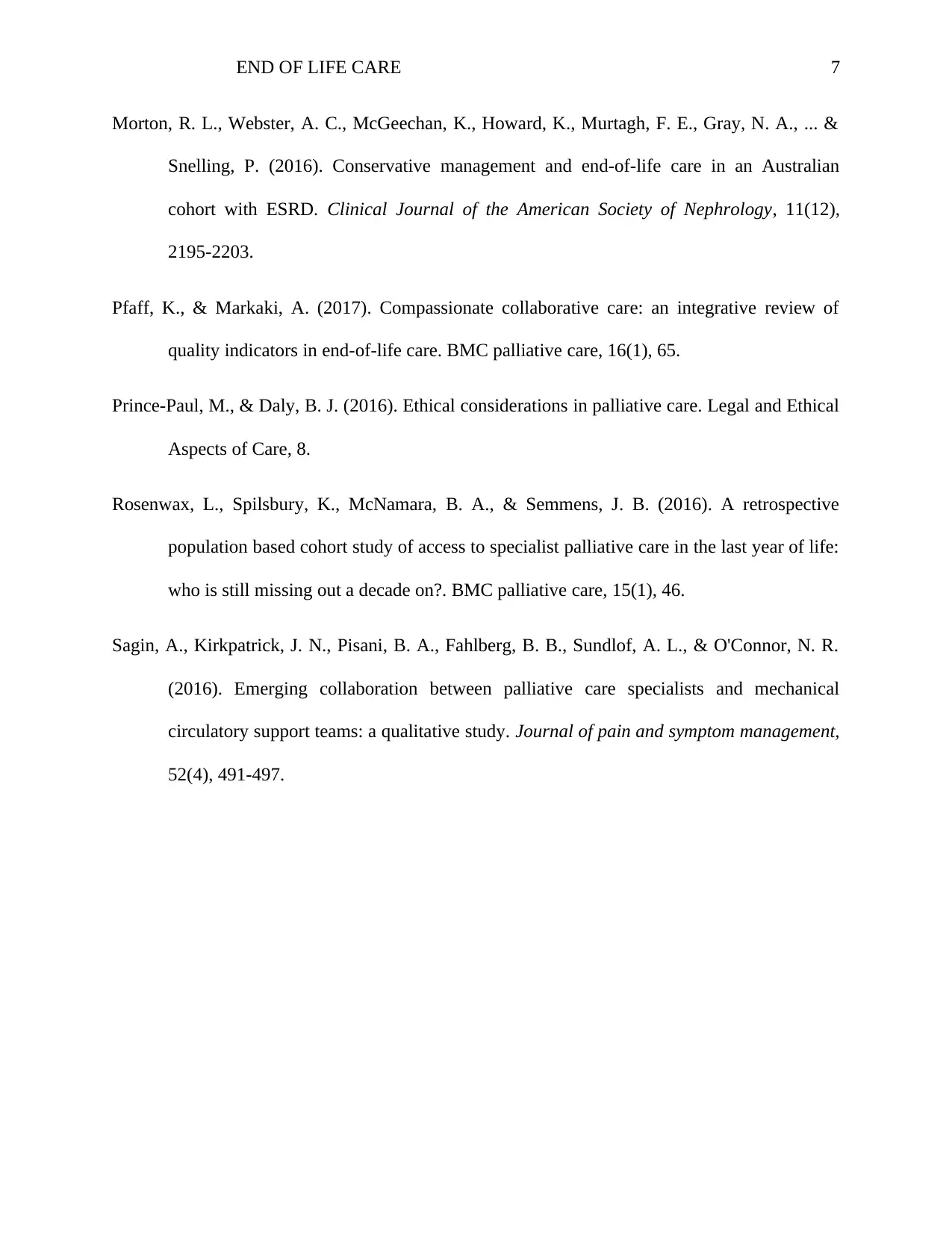
END OF LIFE CARE 7
Morton, R. L., Webster, A. C., McGeechan, K., Howard, K., Murtagh, F. E., Gray, N. A., ... &
Snelling, P. (2016). Conservative management and end-of-life care in an Australian
cohort with ESRD. Clinical Journal of the American Society of Nephrology, 11(12),
2195-2203.
Pfaff, K., & Markaki, A. (2017). Compassionate collaborative care: an integrative review of
quality indicators in end-of-life care. BMC palliative care, 16(1), 65.
Prince-Paul, M., & Daly, B. J. (2016). Ethical considerations in palliative care. Legal and Ethical
Aspects of Care, 8.
Rosenwax, L., Spilsbury, K., McNamara, B. A., & Semmens, J. B. (2016). A retrospective
population based cohort study of access to specialist palliative care in the last year of life:
who is still missing out a decade on?. BMC palliative care, 15(1), 46.
Sagin, A., Kirkpatrick, J. N., Pisani, B. A., Fahlberg, B. B., Sundlof, A. L., & O'Connor, N. R.
(2016). Emerging collaboration between palliative care specialists and mechanical
circulatory support teams: a qualitative study. Journal of pain and symptom management,
52(4), 491-497.
Morton, R. L., Webster, A. C., McGeechan, K., Howard, K., Murtagh, F. E., Gray, N. A., ... &
Snelling, P. (2016). Conservative management and end-of-life care in an Australian
cohort with ESRD. Clinical Journal of the American Society of Nephrology, 11(12),
2195-2203.
Pfaff, K., & Markaki, A. (2017). Compassionate collaborative care: an integrative review of
quality indicators in end-of-life care. BMC palliative care, 16(1), 65.
Prince-Paul, M., & Daly, B. J. (2016). Ethical considerations in palliative care. Legal and Ethical
Aspects of Care, 8.
Rosenwax, L., Spilsbury, K., McNamara, B. A., & Semmens, J. B. (2016). A retrospective
population based cohort study of access to specialist palliative care in the last year of life:
who is still missing out a decade on?. BMC palliative care, 15(1), 46.
Sagin, A., Kirkpatrick, J. N., Pisani, B. A., Fahlberg, B. B., Sundlof, A. L., & O'Connor, N. R.
(2016). Emerging collaboration between palliative care specialists and mechanical
circulatory support teams: a qualitative study. Journal of pain and symptom management,
52(4), 491-497.
1 out of 7
Related Documents
Your All-in-One AI-Powered Toolkit for Academic Success.
+13062052269
info@desklib.com
Available 24*7 on WhatsApp / Email
![[object Object]](/_next/static/media/star-bottom.7253800d.svg)
Unlock your academic potential
Copyright © 2020–2026 A2Z Services. All Rights Reserved. Developed and managed by ZUCOL.





